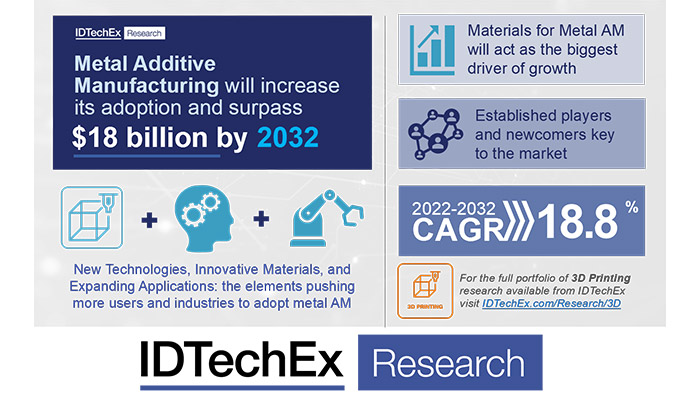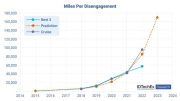Many wondered how the metal additive manufacturing industry would fare after the upheaval brought by COVID-19. The pandemic has significantly impacted a key target market for metal additive manufacturing – aviation. Additionally, global supply chain disruptions have led companies to re-evaluate their operations. Within this environment, how has metal additive manufacturing fared?
In IDTechEx’s new report, “Metal Additive Manufacturing 2022-2032: Technology and Market Outlook“, the metal 3D printing industry’s current state has been comprehensively analyzed. IDTechEx finds that after the short-term loss caused by COVID-19, the metal additive manufacturing market has recovered to hit $18.5 billion by 2032.
With a CAGR of 18.8%, metal 3D printing is clearly a dynamic field. Finding the value-add use cases, from reducing the inventory of replacement parts to making complex production parts, is enabling wider adoption of metal AM across many key industries. Within this landscape, IDTechEx has identified several key trends influencing the metal AM market.
Lower–cost printers
Printers for established technologies like laser powder bed fusion or electron beam melting often cost $300K-$500K, with many exceeding $1 million. The high investment needed to engage in metal 3D printing creates high barriers to entry for SMEs. To lower this barrier to adoption, several companies like Xact Metal and One Click Metal have focused on making printers more affordable with price tags less than $100K.
Expanding materials portfolio
One factor limiting metal AM’s penetration is the limited size of available metals for AM. Not only are relatively few high-performance metals available for demanding applications, but the cost of metal powders often exceeds hundreds per kilo. To address this, materials start-ups are exploring high-performance metals like aluminum and alternative feedstock forms like pellets and slurries.
New entrants into binder jetting
Two major players, ExOne and voxeljet, have dominated the binder jetting space since its commercialization. However, the promise that metal binder jetting offers for high volume metal part production is leading more companies to launch their own binder jetting printers. Notably, this includes established companies like GE, HP, and Desktop Metal. IDTechEx expects to see the binder jetting landscape become more competitive in the medium-term.
The global supply chain and localized manufacturing
Skyrocketing shipping costs and worker shortages have contributed to disturbances in the global supply chain. This has renewed interest in localized manufacturing to mitigate risks when relying on global manufacturing. Within this environment, metal AM has received attention for facilitating localized manufacturing.
Continued innovation in printing processes
Established printing technologies like DED or EBM have well-known limitations, like slow build speeds or poor resolution, which limit their adoption in certain applications. These limitations have inspired start-ups to create their own variations on established technologies or to commercialize alternative technologies. The IDTechEx report examines the metal AM technology landscape with benchmarking studies that identify the limitations and opportunities for technology development in metal AM.
Contract manufacturers founded on proprietary printing technologies
The classic business model for 3D printing companies has been to manufacture and sell printers to customers. Several companies, mindful of issues with this strategy, have opted to use their proprietary printing technology exclusively for in-house part production. These contract manufacturers might bring new end-users to metal additive manufacturing by eliminating normal barriers for adoption, like high capital expenditure and the need for labor skilled in AM.
Market forecasts for Metal Additive Manufacturing
The new IDTechEx report “Metal Additive Manufacturing 2022-2032: Technology and Market Outlook” forecasts future revenue, install base, and materials demand for the metal AM market while carefully segmenting the metal AM technology and materials market by 10 process categories and 9 metal material categories. Additionally, IDTechEx analyzes each metal printing technology and provides detailed discussion on the metal AM materials market.
For further information on this market including interview-based profiles of the main players, technology benchmarking studies, granular 10-year market forecasts, and application case-studies, please visit www.IDTechEx.com/MetalAM, or for the full portfolio of 3D Printing research available from IDTechEx please visit www.IDTechEx.com/Research/3D .
About IDTechEx
IDTechEx guides your strategic business decisions through its Research, Subscription and Consultancy products, helping you profit from emerging technologies. For more information, contact research@IDTechEx.com or visit www.IDTechEx.com.







Be the first to comment on "Metal Additive Manufacturing Rebounds to Hit $18 Billion by 2032, Reports IDTechEx"